It’s easy to feel defeated these days. It takes more effort and conscious positivity to focus on the future, on the historic firsts. We elected a record number of women to the House this year, including 29-year-old Alexandria Ocasio-Cortez. Ilhan Omar and Rashida Tlaib became the first Muslim women in Congress, while Sharice Davids and Deb Haaland became the first Native American Congresswomen. Florida elected their first openly lesbian mayor. There’s so much more. On a personal note, I teach high school students from across the United States. They all inspire me, but my female students in particular give me hope. From New York City to Detroit to Sioux Falls, they are canvassing, organizing community meetings and protests, creating change. I am flooded with strength as I look to the future.
So, in gazing forward while reflecting back on 2018, I want to highlight the women writers I’ve fallen in love with this year. I’ve read 35 books so far, and though some were written by men, we as a society need to #readmorewomen.
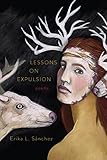
 In poetry, Natalie Diaz’s When My Brother Was an Aztec and Erika L. Sánchez’s Lessons on Expulsion both consider addiction, family life, dreams, myth, and cultural history. These powerful poems dismantled and surprised me. Emily Jungmin Yoon’s debut collection, A Cruelty Special to Our Species, is stunning. Written in the voices of Korean “comfort women,” Yoon’s poems about sexual violence, gender, and oppression are brutal, incisive, and necessary.
In poetry, Natalie Diaz’s When My Brother Was an Aztec and Erika L. Sánchez’s Lessons on Expulsion both consider addiction, family life, dreams, myth, and cultural history. These powerful poems dismantled and surprised me. Emily Jungmin Yoon’s debut collection, A Cruelty Special to Our Species, is stunning. Written in the voices of Korean “comfort women,” Yoon’s poems about sexual violence, gender, and oppression are brutal, incisive, and necessary.
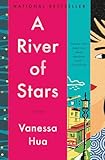

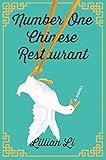 My first novel was published in August, and with publication came an eventful book tour, which I’m profoundly grateful for. At the same time, book publication also brought the fear that I was speaking about myself, my writing process, and my novel too much. I found refuge in novels written by the wonderful writers I was lucky enough to do events with. I was drawn into the strange and magical What Should Be Wild by Julia Fine. In this dark, feminist novel a girl named Maisie has the power to kill and resurrect with her touch. I read What We Were Promised by Lucy Tan, The Incendiaries by R.O. Kwon, Number One Chinese Restaurant by Lillian Li, Fruit of the Drunken Tree by Ingrid Rojas Contreras, A River of Stars by Vanessa Hua, and The Golden State by Lydia Kiesling in a packed, whirlwind of knock-out debut fiction. I loved Naima Coster’s Halsey Street, which alternates between Penelope, a young woman who returns to a gentrified Brooklyn to care for her ailing father, and Mirella, Penelope’s estranged mother in the Dominican Republic. In Aja Gabel’s The Ensemble, four friends navigate their entwined careers, love lives, successes, and failures as a string quartet. Gabel’s descriptions of music, music-making, and auditory pleasure were absolutely beautiful.
My first novel was published in August, and with publication came an eventful book tour, which I’m profoundly grateful for. At the same time, book publication also brought the fear that I was speaking about myself, my writing process, and my novel too much. I found refuge in novels written by the wonderful writers I was lucky enough to do events with. I was drawn into the strange and magical What Should Be Wild by Julia Fine. In this dark, feminist novel a girl named Maisie has the power to kill and resurrect with her touch. I read What We Were Promised by Lucy Tan, The Incendiaries by R.O. Kwon, Number One Chinese Restaurant by Lillian Li, Fruit of the Drunken Tree by Ingrid Rojas Contreras, A River of Stars by Vanessa Hua, and The Golden State by Lydia Kiesling in a packed, whirlwind of knock-out debut fiction. I loved Naima Coster’s Halsey Street, which alternates between Penelope, a young woman who returns to a gentrified Brooklyn to care for her ailing father, and Mirella, Penelope’s estranged mother in the Dominican Republic. In Aja Gabel’s The Ensemble, four friends navigate their entwined careers, love lives, successes, and failures as a string quartet. Gabel’s descriptions of music, music-making, and auditory pleasure were absolutely beautiful.

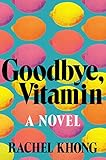
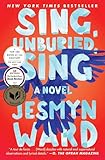 Elsewhere in fiction, I read Jean Rhys’s Wide Sargasso Sea for the first time. What took me so long? I want to devour everything she’s written, and I want more books that reimagine our literary canon. I finished Jesmyn Ward’s Sing, Unburied, Sing while on a weekend break from book tour. It made me want to return to my writing desk immediately. Ward is a literary genius, and I will read everything she writes. In more recent fiction, Goodbye, Vitamin by Rachel Khong and You Too Can Have a Body Like Mine by Alexandra Kleeman both made me reconsider the body, food, consumption, and our desire to belong.
Elsewhere in fiction, I read Jean Rhys’s Wide Sargasso Sea for the first time. What took me so long? I want to devour everything she’s written, and I want more books that reimagine our literary canon. I finished Jesmyn Ward’s Sing, Unburied, Sing while on a weekend break from book tour. It made me want to return to my writing desk immediately. Ward is a literary genius, and I will read everything she writes. In more recent fiction, Goodbye, Vitamin by Rachel Khong and You Too Can Have a Body Like Mine by Alexandra Kleeman both made me reconsider the body, food, consumption, and our desire to belong.


 In nonfiction, Nicole Chung’s memoir All You Can Ever Know about the adopted author’s decision to find her biological family moved me with its honest portrayal of the fears we have about belonging, identity, and motherhood. I read Bluets by Maggie Nelson on a beach, staring at the blue of the ocean, the sky. One of my dearest girlfriends gifted me Kayleen Schaefer’s Text Me When You Get Home: The Evolution and Triumph of Modern Female Friendships, which reinvigorated me to reach out to all of my female friends, to strengthen those relationships even in adulthood.
In nonfiction, Nicole Chung’s memoir All You Can Ever Know about the adopted author’s decision to find her biological family moved me with its honest portrayal of the fears we have about belonging, identity, and motherhood. I read Bluets by Maggie Nelson on a beach, staring at the blue of the ocean, the sky. One of my dearest girlfriends gifted me Kayleen Schaefer’s Text Me When You Get Home: The Evolution and Triumph of Modern Female Friendships, which reinvigorated me to reach out to all of my female friends, to strengthen those relationships even in adulthood.
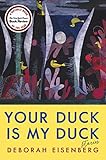 I want to end with Deborah Eisenberg’s short story collection Your Duck Is My Duck because she is one of our best living writers. Her fiction precisely illuminates what it feels like to be alive, to wade through our world in its natural beauty and manmade devastation. Her writing is political and true, intimate and expansive.
I want to end with Deborah Eisenberg’s short story collection Your Duck Is My Duck because she is one of our best living writers. Her fiction precisely illuminates what it feels like to be alive, to wade through our world in its natural beauty and manmade devastation. Her writing is political and true, intimate and expansive.
I hope to read more in these last weeks before 2019 arrives. I’ve just started Hala Alyan’s Salt Houses. Toni Morrison’s Paradise awaits, as does Jenny Xie’s Eye Level. Diana Khoi Nguyen’s Ghost Of is on backorder at my local bookstore. There is so much more to read and so much more to hope for, and I am grateful.
More from A Year in Reading 2018
Don’t miss: A Year in Reading 2017, 2016, 2015, 2014, 2013, 2012, 2011, 2010, 2009, 2008, 2007, 2006, 2005
The post A Year in Reading: Crystal Hana Kim appeared first on The Millions.
from The Millions https://ift.tt/2KYqFu4
Comments
Post a Comment